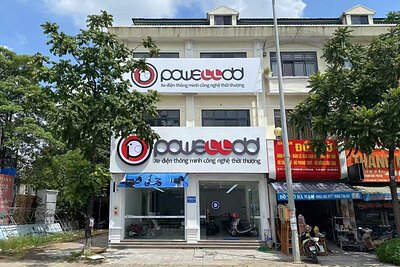
Vietnam's EV Two-Wheeler Market Sparks with AIMA Tech's Rapid Expansion
Chinese manufacturer AIMA Tech is aggressively expanding into Vietnam’s booming electric two-wheeler market, challenging local players and promising affordable EV options for commuters. But can they sustain this rapid growth?
Vietnam's EV Two-Wheeler Market Sparks with AIMA Tech's Rapid Expansion
Guigang, China & Hanoi, Vietnam – November 15, 2025 – Vietnam is rapidly becoming a hotbed for electric vehicle (EV) adoption, and Chinese manufacturer AIMA Technology is accelerating the trend with a swift expansion of its POWELLDD electric two-wheeler brand. Launching with three new models and establishing over 20 branded stores nationwide in a matter of months, AIMA is poised to challenge established local and Japanese players in this burgeoning market.
For years, Vietnam’s streets have been dominated by gasoline-powered scooters and motorcycles. But a confluence of factors – rising fuel prices, increasing environmental awareness, and supportive government policies – is driving a dramatic shift towards electric mobility. The Vietnamese government is actively incentivizing EV purchases through tax breaks and subsidies, creating a fertile ground for brands like POWELLDD to flourish.
"The Vietnamese consumer is incredibly price-sensitive, but also increasingly aware of the benefits of electric vehicles," notes a local market analyst. "Brands that can offer a compelling combination of affordability, reliability, and style will be the ones to succeed."
A Rapid Rollout & Strategic Models
AIMA’s aggressive expansion strategy is evident in its swift establishment of a nationwide retail network. Within a short timeframe, the company has opened over 20 branded stores in key cities like Hanoi, Ho Chi Minh City, Da Nang, Bac Ninh, and Hai Duong. This rapid rollout signifies a significant investment in the Vietnamese market and a commitment to building a strong local presence.
The launch of three distinct models – the WESPAN PRO, POWELLDD SHINE, and POWELLDD SWEETEA – caters to diverse consumer segments. The WESPAN PRO targets urban professionals seeking a stylish and refined riding experience, boasting an 800W motor and European-inspired design. The POWELLDD SHINE, aimed at students and young commuters, offers a blend of affordability and practicality. But it’s the SWEETEA model that appears to be making the biggest splash, positioned as an accessible and reliable option for everyday commuting.
“The SWEETEA is particularly well-received because it addresses a key pain point for many Vietnamese consumers – the high cost of transportation,” explains a local retailer. “It’s a no-frills, dependable scooter that gets the job done without breaking the bank.”
Challenging the Status Quo
AIMA’s entrance into the Vietnamese market isn't going unnoticed by established players. Local manufacturer VinFast, which has heavily invested in electric vehicles, is a direct competitor, offering a range of electric scooters and motorcycles. Japanese giants Honda and Yamaha, with decades of experience and a strong brand reputation, are also vying for market share.
“The competition is fierce,” acknowledges an industry insider. “VinFast has a strong local presence and a commitment to innovation. Honda and Yamaha have established dealer networks and a loyal customer base. AIMA will need to differentiate itself through pricing, product quality, and customer service to gain traction.”
However, AIMA brings several advantages to the table. Its established manufacturing facilities in both Vietnam and Indonesia allow for cost-effective production and a streamlined supply chain. The company’s commitment to research and development is evident in its innovative designs and features. And its aggressive pricing strategy positions it as a compelling alternative to existing brands.
Sustainability and Local Impact
Beyond the competitive landscape, AIMA's expansion has broader implications for Vietnam’s sustainability goals. The proliferation of electric two-wheelers contributes to reduced air pollution and a lower carbon footprint, aligning with the country’s commitment to environmental protection.
The company is also creating local employment opportunities through its retail network and manufacturing facilities. “We are committed to contributing to the Vietnamese economy and creating value for local communities,” a spokesperson for AIMA stated.
The Road Ahead
While AIMA’s initial foray into the Vietnamese market has been impressive, sustaining this rapid growth will require a long-term commitment to innovation, customer satisfaction, and adaptability. The company will need to continuously monitor market trends, address evolving consumer preferences, and invest in infrastructure to support the growing demand for electric two-wheelers.
“The Vietnamese market is dynamic and competitive,” cautions a market analyst. “AIMA has made a strong start, but they will need to stay agile and responsive to maintain their momentum.”
Ultimately, AIMA’s success in Vietnam will depend on its ability to deliver on its promise of affordable, reliable, and sustainable electric mobility. The company's ambitious expansion strategy has sparked a new wave of competition in the Vietnamese EV market, and consumers are poised to benefit from the innovation and choice that this increased competition brings.
